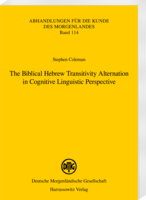|
|
Download:
Please note: With adding digital Products to your cart
the payment will be handled via PayPal. The download will be provided after the payment is confirmed. In biblical Hebrew there is a group of verbs which appear in both transitive and intransitive grammatical constructions. However, explanations of this phenomenon, especially regarding the grammatical status of the Object, have been unsatisfactorily vague as evidenced by the inconsistent or ad hoc treatments offered by modern biblical Hebrew grammarians. In recent years, many issues relevant to the biblical Hebrew transitivity alternation have received sustained treatment in the broader linguistic community.
The purpose of this monograph by Stephen M. Coleman is to offer an extended treatment of the biblical Hebrew transitivity alternation utilizing the insights of modern linguistics, specifically the theory and methods of Cognitive Grammar and the related (sub)discipline Construction Grammar. The author argues that the biblical Hebrew transitivity alternation is licensed and limited by conceptual factors. Though often translated and interpreted as essentially synonymous expressions, verbs exhibiting the transitivity alternation offer alternate construals of the realities they represent and therefore should be regarded as having different meanings. Even though the application of Cognitive Grammar to the analysis of ancient languages in general, and biblical Hebrew in particular, is an approach that is in many ways still in its infancy, the present study demonstrates its potential to offer new answers to old and seemingly insoluble questions. |
|||||||||||||||||||||||||||||||||||||||






